- Home
- Alex Berenson
The Deceivers
The Deceivers Read online
ALSO BY ALEX BERENSON
The Prisoner
The Wolves
Twelve Days
The Counterfeit Agent
The Night Ranger
The Shadow Patrol
The Secret Soldier
The Midnight House
The Silent Man
The Ghost War
The Faithful Spy
The Number (nonfiction)
G. P. PUTNAM’S SONS
Publishers Since 1838
An imprint of Penguin Random House LLC
375 Hudson Street
New York, New York 10014
Copyright © 2018 by Alex Berenson
Penguin supports copyright. Copyright fuels creativity, encourages diverse voices, promotes free speech, and creates a vibrant culture. Thank you for buying an authorized edition of this book and for complying with copyright laws by not reproducing, scanning, or distributing any part of it in any form without permission. You are supporting writers and allowing Penguin to continue to publish books for every reader.
Ebook ISBN: 9780698407534
Library of Congress Cataloging-in-Publication Data
Names: Berenson, Alex, author.
Title: The deceivers / Alex Berenson.
Description: New York : G.P. Putnam’s Sons, [2018] | Series: A John Wells novel ; 12
Identifiers: LCCN 2017037135 | ISBN 9780399176166 (hardcover)
Subjects: LCSH: Wells, John (Fictitious character)—Fiction. | United States. Central Intelligence Agency—Fiction. | Terrorism—Prevention—Fiction. | Intelligence officers—Fiction. | Conspiracies—Fiction. | BISAC: FICTION / Suspense. | FICTION / Espionage. | GSAFD: Suspense fiction. | Spy stories.
Classification: LCC PS3602.E75146 D43 2018 | DDC 813/.6—dc23
LC record available at https://lccn.loc.gov/2017037135
This is a work of fiction. Names, characters, places, and incidents either are the product of the author’s imagination or are used fictitiously, and any resemblance to actual persons, living or dead, businesses, companies, events, or locales is entirely coincidental.
Version_1
FOR NEIL NYREN, THE BOSS
CONTENTS
Also by Alex Berenson
Title Page
Copyright
Dedication
Epigraph
Prologue
PART ONE Chapter 1
Chapter 2
Chapter 3
Chapter 4
Chapter 5
Chapter 6
Chapter 7
Chapter 8
Chapter 9
PART TWO Chapter 10
Chapter 11
Chapter 12
Chapter 13
Chapter 14
Chapter 15
Chapter 16
Chapter 17
Chapter 18
Chapter 19
Chapter 20
PART THREE Chapter 21
Chapter 22
Chapter 23
Chapter 24
Chapter 25
Chapter 26
Epilogue
Acknowledgments
About the Author
For the worst of all deceptions is self-deception.
—Socrates, as quoted in Plato’s Cratylus
PROLOGUE
DALLAS, TEXAS
Ahmed Shakir should have gone with his gut.
He’d met the guy at the Dirt Hole in East Dallas. Despite its name, the place was a decent enough bar. It had thirty-cent wings at happy hour, a pool table that needed new felt.
And a bartender named Dale. For two hundred bucks a month, Dale looked the other way when Shakir sold coke out of the bathroom. Shakir wasn’t Pablo Escobar, but he dealt more than casually. Fifteen regular buyers, thirty or so occasionals. Enough to keep him busy.
Shakir’s customers were nice white people. They called him Adam. They didn’t seem to mind that he’d been born in Cairo. He had mastered the secrets to success for drug dealers. He didn’t use his own product, didn’t sell on credit, didn’t get greedy. He was small, with wiry black hair and dark eyes. A forgettable face, which suited him fine.
But everything went sideways after that Thursday night, cool for Dallas in the fall. The Bengals and Falcons played on the flat-screen behind the long wooden bar. Katy Perry sang about teenage dreams on the satellite radio. Shakir was in his usual spot, the booth by the bathrooms. Dale nodded him over.
“Somebody wants to say hi.”
The guy sat alone on a stool in front of the taps. He wore cowboy boots and a black sweater with sleeves pulled up to reveal a steel watch. Shakir hadn’t seen him before. The Dirt Hole attracted cable technicians, UPS supervisors. This guy was fancier.
He caught Shakir looking, tipped his Heineken.
Up close the guy’s skin was pockmarked. The watch was a Rolex. “I’m Jake.” His fingers twirled on the bar. Antsy hands. Cocaine hands.
“Adam.”
“That so?” The guy gave Shakir a sly sideways look that stuck in Shakir’s throat. “Bartender says you’re the man with the plan.”
Shakir didn’t recognize his accent. It wasn’t Texas. “I don’t know you.”
“My guy’s not answering. A girl I know said she hooked up here—”
“Name?”
“Katrina. Tall. Pretty. Short blond hair.”
And cold blue eyes. Shakir remembered her. She’d come to the Dirt Hole with a squinty little guy named Jimmy who owned a steak house. Katrina was taller than Jimmy and in a different time zone looks-wise. Shakir saw plenty of those pairs. You couldn’t be a coke whore if you didn’t like cocaine. Hearing Jake mention her made Shakir feel better. She was no narc. She’d practically marched Jimmy to the bathroom to start the party.
“Says your stuff is primo. She would know.”
Word of mouth, the best marketing. “What are you looking for?”
Jake nodded at the pool table. An eight-ball, then. An eighth of an ounce of cocaine, or three and a half grams. Also known as a party ball. Enough for a few friends to have a late night or one dedicated user to go on a bloody-nose rock-star bender. Shakir charged his regulars two hundred dollars for an eight-ball and everyone else two-fifty. A lot of coke to want on a first buy, enough to make Shakir nervous.
Though Jake’s Rolex suggested money wasn’t a problem.
“You drive here?”
“Flew on my broom.”
“Keys.” Shakir held out his hand. Jake seemed to understand that if he wanted his Bolivian marching powder, he would need to play nice. He handed Shakir an Audi key fob.
“Drive carefully. That’s my baby.”
Shakir found the A4 at the end of the parking lot, its midnight blue paint glowing under the lights. Standard black-and-white Texas plates. Shakir walked around it, seeing nothing unusual, nothing that suggested the car belonged to the cops or the Drug Enforcement Administration. The lot was mostly empty tonight. No weird dry-cleaning company vans or guys in trucker caps keeping a too-casual eye on him. Not that he rated that kind of attention.
Shakir slipped on gloves, slid inside. The A4 was so new that the leather still smelled fresh. Whoever he was, Jake kept his car immaculate. No candy wrappers or fast-food bags. The glove box held only the slim owner’s manual, no registration or insurance. Or pistol.
Shakir drove southwest toward Deep Ellum, slowed for a yellow light. As it turne
d red, he gunned the engine and swung left. A few turns later, he was on Highway 75. Then east on I-30 among the big rigs. Nice car. He was no expert, but as far as he could tell, no one was on him.
He was going to a lot of trouble to sell one eight-ball. But Shakir didn’t know what to make of this guy. Jake was too slick for his taste. Yet Shakir also sensed he might turn into a good customer, a fish who wouldn’t care about price. Shakir hadn’t had one of those in a year, since he’d lost a cardiologist at Presbyterian to rehab.
Shakir drove another five miles east before doubling back to the Dirt Hole. He parked the Audi where he’d found it, tucked a plastic bag holding three and a half grams of cocaine under the driver’s seat, stepped out.
Jake stood outside the front door, arms folded over his chest. “I was about to call the cops.” Shakir stepped past. Inside, they settled into Shakir’s booth. The Mavs game was winding down, the Mavs up twenty on the ridiculous Brooklyn Nets.
“See why you like that car. How do you pay for it?”
“I’m a lawyer.”
“Have a card?”
“You’re not the only one taking a chance. I don’t care if your stuff is straight from the jungle, gimme my keys—”
Shakir slid them over. “Before you go, bet you the Mavs win.”
“Now you’re a bookie?”
“Two-fifty. I got the Mavs. You got the Nets.”
Jake looked at the screen. Understanding dawned, and he extended a hand. “Two-fifty, sure.”
Thirty seconds later, the game ended. Jake slid five fifty-dollar bills to Shakir. “Last time I bet basketball. So? We just do it here?”
Shakir kept a straight face. “Go home.”
“My money—”
“Make sure you adjust your seat.”
Jake’s head swiveled to the door. “If I have to come back—” he said, and trotted out.
In three minutes, Jake did come back, and Shakir felt a flutter of anxiety. He had protected himself from a typical buy-and-bust. His fingerprints weren’t on the bag or the Audi. The bet gave him at least a little cover for Jake’s money. But if they were after him, if they’d wired the car . . . Why, though? Shakir couldn’t see anyone going to that much trouble for a three-gram bust. Not when South Dallas was an open-air drug market.
“My man,” Jake muttered in his ear. “Katrina was right. I mean, that is tippy-toppy. You feel me?”
Shakir wondered why cocaine made lawyers talk like rappers.
“Gimme your number.”
Shakir wasn’t ready to be on intimate terms with this guy. “I’m here Thursdays and Sundays.”
On Sunday, Jake picked up another eight-ball. The next week, too. But he didn’t show up the week after that. Too bad. Guys who dropped five hundred a week weren’t easy to come by.
Then Jake was back. A Thursday, early, barely 9 p.m. Wearing a white shirt lined with sequins. Yeah, sequins. Two women with him, blond and brunette, stuffed into dresses that barely covered their asses. “My man. Meet Amber and Lacey.” He was slurring a bit.
“Riley,” the blonde said. “Not Lacey.” She smiled like she didn’t care.
Jake pulled out a money clip thick with hundreds and tossed one out. Actually tossed it. They all watched it flutter down. “Ladies, have a drink.” He wrapped an arm around Shakir’s shoulder. “You, walk with me.”
Outside, sirens blared to the west. Shakir tried to shrug off the crawling sense they were meant for him.
“Need a little more tonight. Two ounces.” The words fast and low.
Two ounces would last even the most serious cokehead for weeks, and the party might end with a heart attack. Shakir was also well aware that under Texas law, selling fewer than four grams of cocaine was a third-degree felony. More moved the crime to second-degree.
An eight-ball fell conveniently just under the four-gram line. Two ounces—fifty-six grams—did not. In four years of dealing, Shakir had sold that much only once before, to the cardiologist. The guy said he was going on vacation for five weeks. Hate to run out in the middle of the Grand Canyon. He rubbed his runny nose. By then, Shakir knew the doc was headed for rehab. Or worse. Problem with coke, your best customers eventually went south.
“Who’s it for?”
“These girls party. And their friends. Figured I’d pick up what I needed for the weekend all at once. Maybe a volume discount, know what I’m saying?”
“No.”
“Help a brother out. Party with us, if you want—”
“Forget it.”
“An ounce? Don’t make me beg, Adam.”
Suddenly Shakir changed his mind. An ounce or two ounces made no difference; either way, he was deep in second-degree felony territory. He either cut Jake loose or took his money. And he wasn’t ready to cut Jake loose. “Two ounces. Fine. But no discount. Four thousand flat.” The price of sixteen eight-balls. He’d cut it more than usual, too. Make two grand–plus for a few minutes’ work.
“Should be like twenty-two, twenty-four hundred.”
“Call your old dealer, then.”
“Thirty-five. But it’s gotta be now. Like, right now.”
By the dumpster behind the bar, Jake counted thirty-five hundred-dollar bills from his clip.
“Give me your keys. I’ll be back.” Shakir wasn’t sure why he was still pushing Jake’s buttons, except that he didn’t like the guy.
“Take your own car. Don’t be a peasant.”
Peasant. An odd word. At the end—the very end—Shakir would remember it. But at the time, in the lot, with the bar garbage perfuming the night air, it merely annoyed him. “Keys or no deal.”
Shakir lived with a purebred Persian cat whom he’d cheekily named Base—as in freebase—in a one-story ranch in East Dallas. He paid the mortgage every month with money orders. He kept his scales in the kitchen—nothing illegal about scales—and his stash in a wall safe. Now Base whined for milk as Shakir weighed out forty-nine grams of cocaine and seven grams of mannitol. A seven-eighths cut was plenty fair. He covered his mouth with a surgical mask, blended the powders, poured the whitish mix into a plastic sandwich bag.
His pulse thumped as he tucked the baggie into the Audi’s glove compartment. He was taking a risk for no good reason. Maybe he was tired of selling cocaine by the gram to sniffling electricians. Tired of living small.
He didn’t even get back to the bar. Three blocks out, a big black SUV loomed behind him and flicked on the red-and-blues in its grille. He thought about putting pedal to floor. Then a second SUV appeared beside the first. Chevy Tahoes, brand-new and mean-looking. Everything about this operation was expensive and new. Shakir wondered why he rated the attention.
He pulled over, lowered the windows. He curled his fingers around the steering wheel like he was already chained to it. The traffic rolled by, drivers gawking. Normals, living boring normal lives. Could he make a deal, talk himself back into their world? But the thought of wearing a wire on his next buy from the Downside D Homeboys, his suppliers, scared him more than prison.
The second Tahoe parked in front, bumper-to-bumper, boxing in the Audi. Two men stepped out of the one behind. They wore black T-shirts and jeans and pistols snug on their hips. Their badges swung on neck chains. Shakir wondered if they were local. No, probably DEA. From what he’d seen, the Dallas cops liked to show off during their arrests. They never used a patrol car when a SWAT team would do. These guys seemed relaxed.
The narc on the driver’s side strutted up. He was white, with a brush cut, and the same bad skin as Jake. They could have been brothers.
“Mr. Shakir. I’m Agent Emery Reed of the Federal Bureau of Investigation.” He even sounded like Jake, the accent unrecognizable to Shakir but not Texan. He flipped open his wallet to show Shakir his identification.
FBI? Not DEA?
“I know this is not your car
. You can tell me where the stuff is. Or we can get a dog, impound it, add grand theft auto to the narcotics charges.”
Shakir sensed this wasn’t the moment to stand on his constitutional rights. “Glove compartment.”
The other agent, a mountain of a man, reached inside with a gloved hand, came out with the baggie.
“Next question. Any firearms?”
Shakir shook his head.
“Good. Let’s take a ride.”
“Am I under arrest?”
The agent pulled a phone from his pocket, tilted the screen: a long-lens shot of Jake handing Shakir money, the dumpster completing the perfect ugliness of the image. “If you don’t come, you will be.”
They frisked him and put him in the back of their Tahoe behind a thick wire screen, but they didn’t cuff him. He assumed they’d take him to the main Dallas FBI offices, west of downtown. Instead, the Tahoe went south. The streets turned mostly poor and black, brightly lit chicken joints and car lots, their NO MONEY DOWN pennants limp in the night air, flags for a losing team. The driver seemed to know exactly where he was going, no GPS necessary.
After fifteen minutes the SUV turned into a corrugated steel garage. Inside, the agents led Shakir into a windowless room, empty except for steel chairs and a table, surveillance cameras high in the corners. Reed put Shakir’s wallet and keys and phone and the hundred-dollar bills in a plastic bag. The second agent took it and disappeared.
“Ahmed Shakir,” Reed said. “You may not believe it, but this is your lucky day. Probably wondering why we picked you up, not the DEA. Why you’re here and not at our office. Thinking we want to flip you.”
Shakir held his tongue. He was in enough trouble already.
“We couldn’t care less about the cocaine. As far as we’re concerned, the war on drugs . . . Well, drugs won. We don’t even work out of Dallas. We’re based in Houston and we’re in CT. Counterterror. We’re interested in your cousin. Second cousin, to be precise.”
Now Shakir understood. “Gamal.”

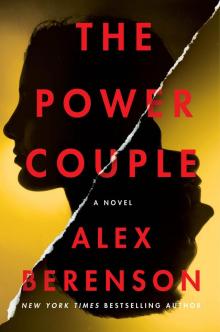 The Power Couple
The Power Couple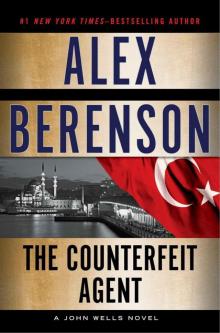 The Counterfeit Agent
The Counterfeit Agent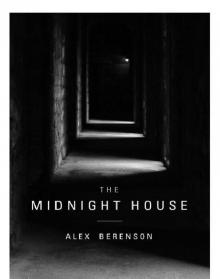 The Midnight House
The Midnight House The Prisoner
The Prisoner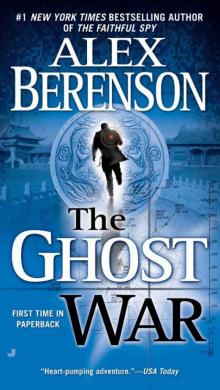 The Ghost War
The Ghost War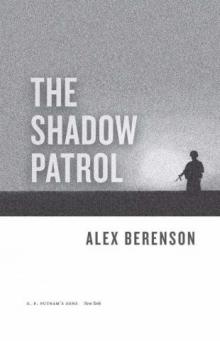 The Shadow Patrol jw-6
The Shadow Patrol jw-6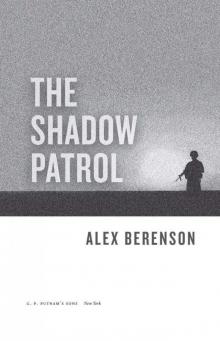 The Shadow Patrol
The Shadow Patrol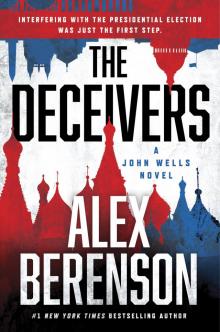 The Deceivers
The Deceivers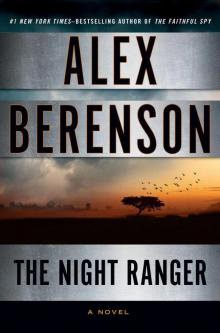 The Night Ranger jw-7
The Night Ranger jw-7 The Faithful Spy
The Faithful Spy The Prince of Beers (Kindle Single)
The Prince of Beers (Kindle Single)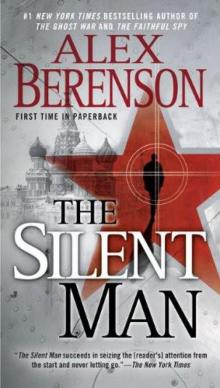 The Silent Man jw-3
The Silent Man jw-3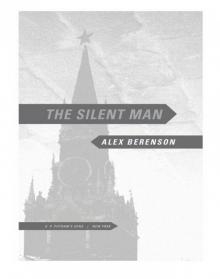 The Silent Man
The Silent Man The Wolves
The Wolves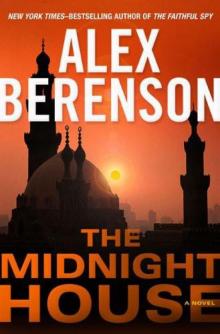 The Midnight House jw-4
The Midnight House jw-4 The Ghost Agent
The Ghost Agent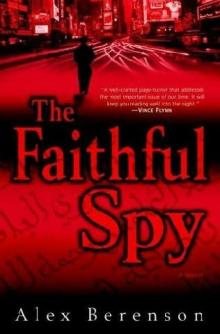 The Faithful Spy jw-1
The Faithful Spy jw-1 The Prince of Beers
The Prince of Beers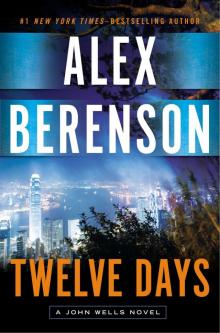 Twelve Days
Twelve Days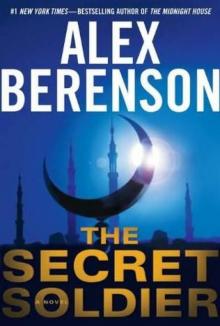 The Secret Soldier jw-5
The Secret Soldier jw-5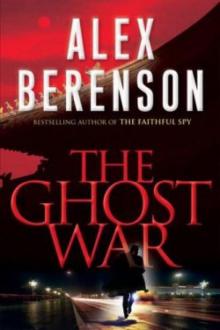 The Ghost War jw-2
The Ghost War jw-2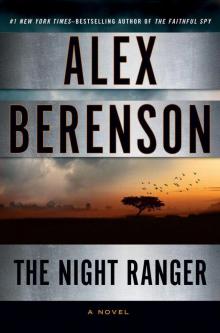 The Night Ranger
The Night Ranger